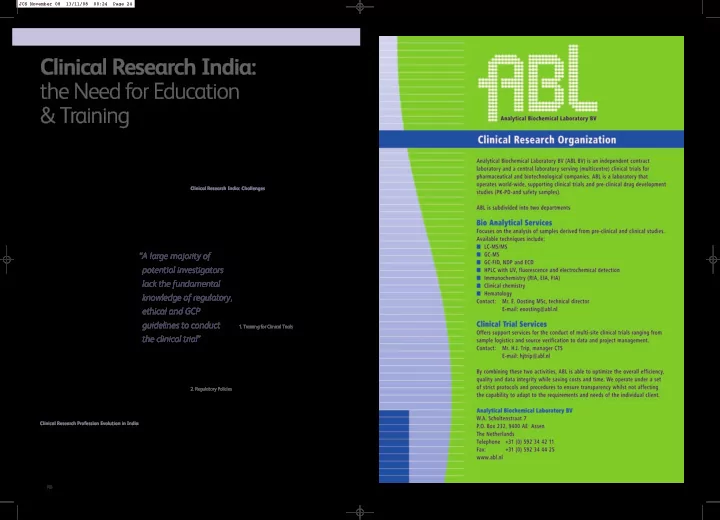

JCS November 08 13/11/08 00:24 Page 24 Clinical Research India: the Need for Education & Training Clinical trials were initiated somewhere in 1537, but they came to has been a significant increase in the number of players in the clinical the limelight when James Lind, in 1747, first introduced control research industry on India’s stage. Global and domestic CROs are now groups in a study of scurvy. Later he went on to become the father providing a wide spectrum of services at different stages of drug of clinical trials. Clinical trials starting flourishing from 1800, and development, creating abundant opportunities not only for medical, although the focus of studies used to be on study design, from 1863 pharmaceutical and paramedical professionals, but also for regulatory onwards the scientists started using placebos. Randomised studies authorities, government and the society at large. were initiated in 1923, and from 1945 the focus moved to ethical aspects of clinical trials. Clinical Research India: Challenges However, a lot has changed in the clinical research scenario since The increase in clinical trials is fuelled by the recent push for global then. Today, clinical trials are conducted through a regulated commerce. Regulatory uncertainties about time to approval, involvement approach following certain guidelines laid down by the of multiple agencies for approval of biotech products and for processing International Conference on Harmonization (ICH), which is import/export licenses, and several other factors, are hurdles in planning spearheaded by the USA, Europe and Japan. a clinical trial. A large majority of potential investigators lack the India has emerged as a global hub for clinical research. According to a fundamental knowledge of regulatory, ethical and GCP guidelines to report by McKinsey, the global clinical trial outsourcing opportunity in India conduct the clinical trial. The quality of global trials and academic clinical in the pharmaceutical industry is estimated to research is not uniform. Due to the acute paucity be around $2 billion by 2010, and there will be of research grants, and the lack of availability of “A large majority of the demand for more than 10,000 investigators a quality clinical trial infrastructure, very few trained in good clinical practice (GCP), and institutions are engaged in world-class clinical potential investigators 50,000 clinical research professionals [1]. research, which focuses on the commercial Analysts project that by 2008, an estimated viability of the end product. Lack of permanent lack the fundamental 30 per cent of global clinical trials are being research staff is another major challenge. In undertaken in developing countries. In India addition, institutional policies are not yet geared knowledge of regulatory, alone, the clinical trials market of $300 million is up to support the investigator in managing expected to grow to nearly $2 billion by 2012. clinical trials efficiently. Some of the major ethical and GCP With increased outsourcing from the US and challenges are as follows: Europe to India, global pharmaceutical guidelines to conduct companies and Indian entrepreneurs have set up 1. Training for Clinical Trials contract research organisations (CROs) in India. Most medical schools lack a formal course in the clinical trial” They are attracting highly competent training for clinical research, and investigators professionals, both in the clinical research have relied on mentors to learn how to conduct profession and the knowledge process outsourcing sector [2]. clinical trials. There is a shortage of trained manpower. India has about In terms of the cost efficiency, India is a better bet as the cost of 500–1000 investigators in the country, as compared to 50,000 in the conducting a trial here is lower by 50 to 60 per cent than in the United United States. With the projections made for the industry in 2010, India States or the European Union. More importantly, because of the huge would need about ten times its present number of investigators [1]. patient load, the recruitment rate can be greatly accelerated which in turn leads to shorter study duration. This provides a major advantage in terms 2. Regulatory Policies of shortening the time to launch a new drug in the market. Based on The Drugs Controller General of India (DCGI) is responsible for regulatory these advantages, the number of clinical trials in India is expected to approvals of clinical trials in India [4]. The DCGI’s office depends on grow exponentially over the next five to ten years. external experts and other government agencies for advice. Additional permissions are required for the export of blood samples to foreign Clinical Research Profession Evolution in India central laboratories. Clinical research is a relatively new concept in India. A decade ago, most All this usually takes about three months in India, whereas the US FDA of the pharmaceutical companies and the contract research gives approval in an average of 30 days. However, most US trials are organisations in India performed only clinical operations. In the early delayed because of the time taken for patient recruitment. The potential phase, pharmaceutical professionals had an edge over other clinical for fast patient recruitment in India may partly make up for the delay in research professionals, but slowly the science graduates, medical, and regulatory approvals. alternate medical professionals entered the industry [3]. Since then, there Certain recent changes in regulatory affairs encourage clinical trials in 22 JCS www.pharmapubs.com
Recommend
More recommend